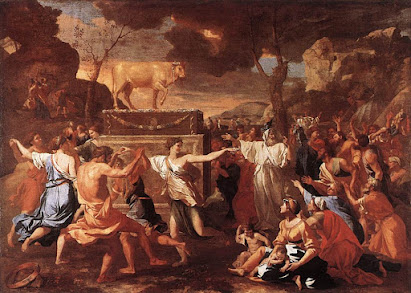What is the difference between empty (and forbidden) religious practices, and genuine faith? We commit idolatry when we replace a relationship with living entity with acts of honor and respect to a lifeless representation or caricature. (Exodus 20:4-6) Ritual is reducing a relationship to a script to be repeated, so many times the words and actions are without substance, merely reciting them by rote. (Isaiah 1:11-15)
Idolatry can be
- Worship of false gods
- Beings that don’t exist
- Beings that exist but are not gods
- Supernatural beings
- Humans or animals or aspects of nature (symbolic representations of natural forces)
- Aspects of life on earth such as career, wealth, possessions, etc.
- False worship of the true God
- Worshipping carved or engraved images as though they represent Him;
- Forbidden practices (sin).
- Pretend acting - putting on a show we don’t believe ourself.
- Meaningless rituals - a form of religion denying its power through actions. (2 Timothy 3:5)
What is the difference between procedures and rituals? Washing hands is a procedure that will cleanse every time. Eating healthy food is an ok ritual because our bodies are made a certain way. Saying ‘I love you’ to our spouse was exciting and meaningful the first time, but likely carries little thought the ten thousandth time. The difference lies in physical world causation vs. relational communication.
Receiving communion can renew our connection to the Lord, but it can also be a rote ritual, or worse, a magic formula to manipulate God. We want to do our thing, and then get off for it by this ritual. God doesn’t work that way. Thinking we can live the world’s way, gratify the flesh, rebel as the devil did, and then get God to forgive us by claiming His promise through empty ritual obedience. Paul warned against this. (1 Cor 11:27-32)
Why did both Aaron and Jeroboam use golden calves as symbols of God? Why was this such a temptation to the Israelites? Gold represents deity, but can also symbolize worldly wealth. Calves are used in ritual sacrifices. According to Ezekiel 1:7&10 the cherubim resembled an ox with the legs of a calf; but this was written much later. Were the cherubim above the mercy seat partly made like oxen or calves? Some Jewish traditions say that the Jews saw this vision when passing through the Red Sea. But the essence of God is not in the symbols, it is in rivers of living water that flow from our innermost being. God’s nature and character is intrinsic to His power. According to Romans 1:25, God judges those who worship the creature rather than the Creator. The Cherubim are creatures, who represent and serve God, but are not God.
Why is saying The Lord’s Prayer not a ritual? How did Jesus intend us to keep it from becoming a thoughtless repetition? (Matthew 6:7) Some thoughts:
- Reflecting on the implications of each phrase in our own current situation.
- Interacting with God on the major dimensions of life.
- Opening our souls to divine-scrutiny, the voice of our conscience, and the moving of the Holy Spirit.
Why does there seem to be a fine line between faith-aiding symbols and empty ritual or false worship? Because this is a heart issue. We want a legal definition that we can debate, that our minds can understand. Jesus wants a committed love relationship. Nicolas Poussin’s painting the adoration of the golden calf (1633-34) depicts the context (Exodus 32:6). Do we seek God Himself, or His permission for, or blessing on gratifying our own desires and actions?
There is a subtle temptation to turn worship of God into idolatry, in other forms. Perhaps we are so touched by a certain style of worship music that we equate it with genuine worship of God. The bronze serpent on the pole that healed those who looked to it became Nehushtan, no longer pointing to God’s healing power, but a bronze sculpture to burn incense to. (2 Kings 18:4)
Is this a question of love languages? What is the difference between a ritual and a genuine expression? A heartfelt expression of love conveys the intensity of desiring the best, the blessing, for the beloved. A ritual attempts to manipulate or control people and/or circumstances without addressing the authority of the power to do so. Ultimately, it is how our worship affects us that determines idolatry. Because, we tend to become like that which we worship.
